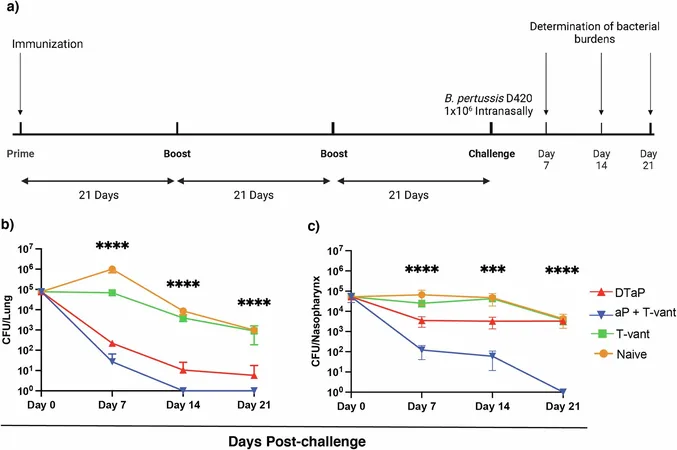
Breakthrough Nasal Vaccine Could Revolutionize Whooping Cough Prevention!
2024-11-18
Author: Daniel
Introduction
Amid a concerning surge in whooping cough cases across the United States, a groundbreaking nasal vaccine developed by researchers at Tulane University has emerged as a beacon of hope in combating this highly contagious respiratory disease.
Limitations of Existing Vaccines
While existing pertussis vaccines have demonstrated effectiveness in preventing whooping cough, which is caused by the Bordetella pertussis bacteria, they fail to eliminate the bacteria from the upper respiratory tract. This loophole allows even vaccinated individuals to remain carriers and unknowingly contribute to the spread of the disease.
Innovative Approach of the Nasal Vaccine
The innovative nasal vaccine harnesses the power of traditional pertussis antigens and pairs them with a cutting-edge adjuvant known as T-vant. This unique combination significantly enhances the body’s immune response within the respiratory tract. In compelling animal studies published in the journal npj Vaccines, mice that received the T-vant vaccine showed no signs of the bacteria in their lungs and nasopharynx—a crucial area behind the nose—three weeks post-infection. In contrast, the traditional intramuscular vaccine left the bacteria flourishing in the upper respiratory tract of the mice.
Quotes from Researchers
Lead researcher Lisa Morici, a professor of microbiology and immunology at Tulane University School of Medicine, stated, 'By developing a vaccine that can not only protect individuals but also prevent transmission, we hope to improve on existing vaccines and limit the spread of whooping cough in communities.' This could be especially crucial as recent data from the Centers for Disease Control and Prevention revealed a staggering five-fold increase in whooping cough cases compared to the previous year.
Safety and Efficacy of the Vaccine
The T-vant adjuvant is derived from natural bacterial outer membrane vesicles, which stimulate the immune system effectively. Importantly, the study confirmed that the vaccine did not induce any adverse effects on lung tissue after immunization, underscoring its safety for potential human use.
Global Impact and Future Prospects
These findings could not be more timely. Whooping cough currently affects approximately 24 million people worldwide each year, with infants and individuals with weakened immune systems being the most vulnerable. The introduction of a vaccine capable of preventing both infection and transmission could potentially pave the way for the elimination of whooping cough.
James McLachlan, co-author of the study and an associate professor of microbiology and immunology at Tulane, emphasized the importance of this vaccine as a formidable step towards public health by stating, 'We are on the brink of a significant advancement that could transform how we manage and prevent whooping cough once and for all.'
Conclusion
As researchers continue their work, the world eagerly awaits the promise of a safer, more effective solution to combat whooping cough and safeguard our communities. This nasal vaccine could be a game-changer in the global fight against infectious diseases. Stay tuned for further updates!



 Brasil (PT)
Brasil (PT)
 Canada (EN)
Canada (EN)
 Chile (ES)
Chile (ES)
 España (ES)
España (ES)
 France (FR)
France (FR)
 Hong Kong (EN)
Hong Kong (EN)
 Italia (IT)
Italia (IT)
 日本 (JA)
日本 (JA)
 Magyarország (HU)
Magyarország (HU)
 Norge (NO)
Norge (NO)
 Polska (PL)
Polska (PL)
 Schweiz (DE)
Schweiz (DE)
 Singapore (EN)
Singapore (EN)
 Sverige (SV)
Sverige (SV)
 Suomi (FI)
Suomi (FI)
 Türkiye (TR)
Türkiye (TR)